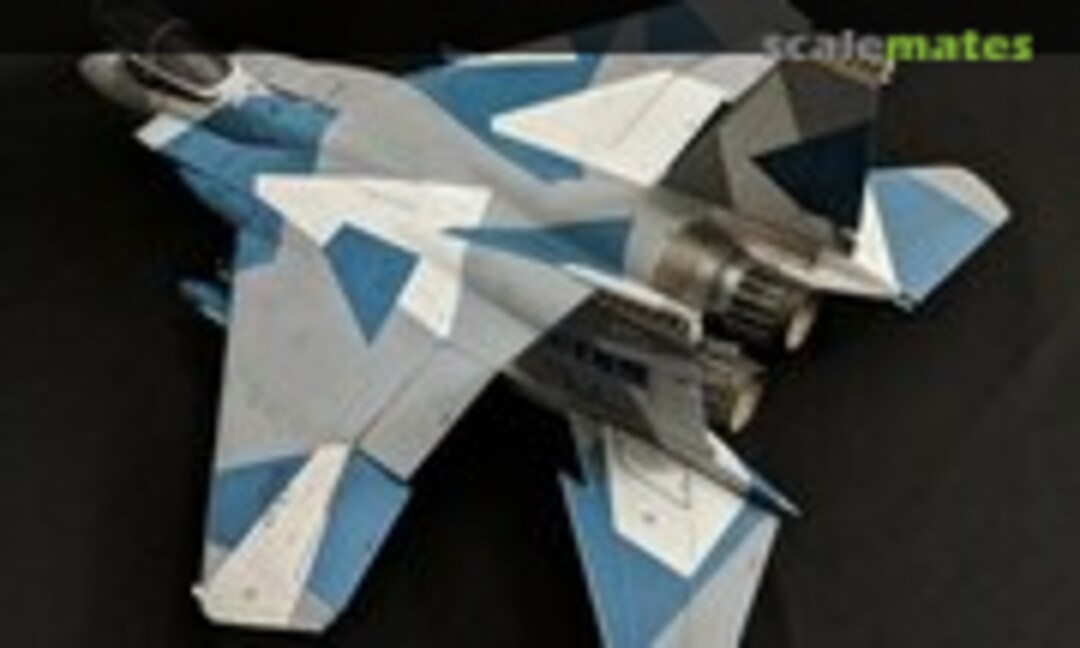Great Wall F-15C Aggressor - Completed!
Kommentare
38 22 August 2018, 02:35
Thanks Donald, Glenn, Marko, Konrad, Sören, and James! I really appreciate the kind words!
22 August 2018, 17:12
hi Michael, wonderful camo, nice painting, do you have any idea if there are decals for this plane in. 1 32 available? greetings
22 August 2018, 18:29
Brilliant job Michael. If you dont mind me asking- What is the role of the Air National Guard ? Probably a dumb question. Thanks.
23 August 2018, 00:13
Thanks Spanjaard, Matthias, Scott, Mike, and John!
Matthias, there are two options for this camo scheme out there. One is VERY hard to find and would be expensive to acquire:
scalemates.com/kits/145251-a..ecals-48-081-65th-aggressors
This sheet is primarily a 1/48 sheet, however there are bonus markings for a different jet in these markings (Blue 09) in 1/32.
A better option that is readily available to buy is this one:
scalemates.com/kits/1136191-..phics-32007-big-scale-eagles
This one would be the exact same jet I built (Blue 94), and Speed Hunter Graphics is the maker of the decals I used as well. They perform flawlessly! The can be purchased here:
reidairpublishing.com/product-p/shg32007.htm
Hope this helps!
23 August 2018, 01:00
Mike,
The Air National Guard was made an official component of the U.S. Air Force in 1947, following the great aerial battles of World War II. Like the Air Force Reserve, the Air National Guard is made up of Citizen Airmen who train part time, close to home, until called upon for duty. These professionals serve both the federal and state governments — assisting their communities and helping the U.S. Air Force guard America's skies.
The Air National Guard is part of the state National Guard and is divided up into units stationed in each of the 50 states, the District of Columbia, the Commonwealth of Puerto Rico and the two U.S. territories. Each state, the District of Columbia and the Commonwealth of Puerto Rico have at least one Air National Guard wing level unit with a flying mission, while the Air National Guard in Guam and the U.S. Virgin Islands are strictly non-flying support organizations at the group or squadron level.
In their "state" role, the Air National Guard may be called up for active duty by the governors to help respond to domestic emergencies and disasters, such as those caused by hurricanes, floods, fires, and earthquakes. In the case of the DC Air National Guard in this role, the Adjutant General of the District of Columbia reports to the Mayor of the District of Columbia, who may only activate DC ANG assets for local purposes after consulting with the President of the United States.
Air National Guard of the United States units or members may be called up for federal active duty in times of Congressionally sanctioned war or national emergency. The President may also call up members and units of the Air National Guard using a process called "federalization", with the consent of state governors or equivalents, to repel invasion, suppress rebellion, or execute federal laws if the United States or any of its states or territories are invaded or is in danger of invasion by a foreign nation, or if there is a rebellion or danger of a rebellion against the authority of the federal government, or if the president is unable to execute the laws of the United States with the regular armed forces.
The United States Air National Guard has about 110,000 men and women in service. Like the Air Force Reserve Command (AFRC), the ANG is often described as a "reserve" force of "part-time airmen," although the demands of maintaining modern aircraft mean that many AFRC and ANG members work full-time, either as full-time Air Reserve Technicians (ART) or Active Guard and Reserve (AGR) personnel. Even traditional part-time air guardsmen, especially pilots, navigators/combat systems officers, air battle managers and enlisted aircrew, often serve 100 or more man-days annually. As such, the concept of Air National Guard service as representing only "one weekend a month and two weeks a year" is not necessarily valid.
Many ANG pilots work for commercial airlines, but in the ANG they may train to fly any of the aircraft in the USAF inventory, with the current exception of the B-1B Lancer and B-52 Stratofortress bombers, E-3 Sentry AWACS aircraft, KC-10 Extender and the AC-130 Gunship.
Above courtesty of Wikipedia (edited)
23 August 2018, 01:11
Nice job Michael! And thanks for the info about the ANG! Always liked the markings on ANG aircraft.
23 August 2018, 07:43
Thanks for the info on the ANG. Thats a hugh force! 110,000 personel. That must be mega expensive to maintain. Must be dufficult for pilots to maintain a licence given the small number of annual flying hours they do.
23 August 2018, 10:22
fantastic result Michael, big huge kudos - was a treat to watch this all along. 🙂
23 August 2018, 13:36
Thanks David, Erik, and Murad! I appreciate eveyone's kind words and hoped you all enjoyed the show along the way!
23 August 2018, 23:54



























